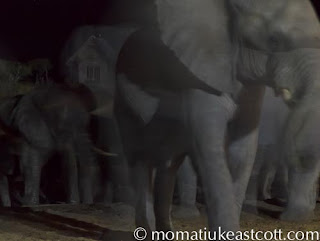John and I drive across the parched skin of Botswana, passing small farm dwellings resembling round bird nests made of clay and crooked branches closely embracing each other. Then we sail across open grasslands, following a narrow track deeply carved in the bed of sand. The darkness comes way too soon -- it is winter -- and we need to stop, for these roads at night are alive with people and animals walking, resting, and just being there.
We turn into a simple bush camp serving mostly overlanders like us, but even its rough edges do not hide a flat TV screen over the bar, and a curio store, and an array of drinks served to parched travelers. There is also a waterhole, filled nightly, which attracts a family of elephants, by now well habituated and marching through the camp day and night, often within feet from flimsy tents.
I go to the bar to grab a beer, and see the elephants drinking muddy water so close I smell the digested grasses and leaves of their giant droppings, a pungent horse scent I always loved. Yet not all is well, and before I finish my beer the matriarch turns abruptly on her great soft feet and, with her trunk raised, takes a few steps toward the people on the wide terrace of the bar. They move back quickly, I hear some nervous laughter, and she slowly retreats, but the illusion of her acceptance of the emotional price her family must pay every day is shattered.
The day closes well, the night air is smooth, and the camp is simple and nice. But suddenly I feel that our human presence and our cabins, our cold beers and our laptops planted right where the elephants must come to drink in order to survive, is deeply obscene. I know this is Africa, where bush camps and lodges are often constructed near such life-giving holes and even supplementing them with water during dry season. I know that considering the absence of poaching in such locations makes them a pretty safe place for animals. And I know that visitors traveling from all over the world to behold these huge pachyderms and other famed animals of the continent come to such waterholes to have a great experience and bring home pictures and memories. And if not for these visitors and their tourist dollars, there would have been no desire and no funds to protect these lands and these animals.
I suspect I may get over my sorrow. I may see there is nothing I can do for this depleted, dissected, and war-torn continent, and its scattered and ever diminishing groups of animals which still survive, restricted by fences, roads, plowed fields, depleted forests, sucked out waterways, and rapidly mushrooming human dwellings. But I hope this deep sense of shame will not leave me for as long as I walk the earth.
©Yva Momatiuk
©Yva Momatiuk


